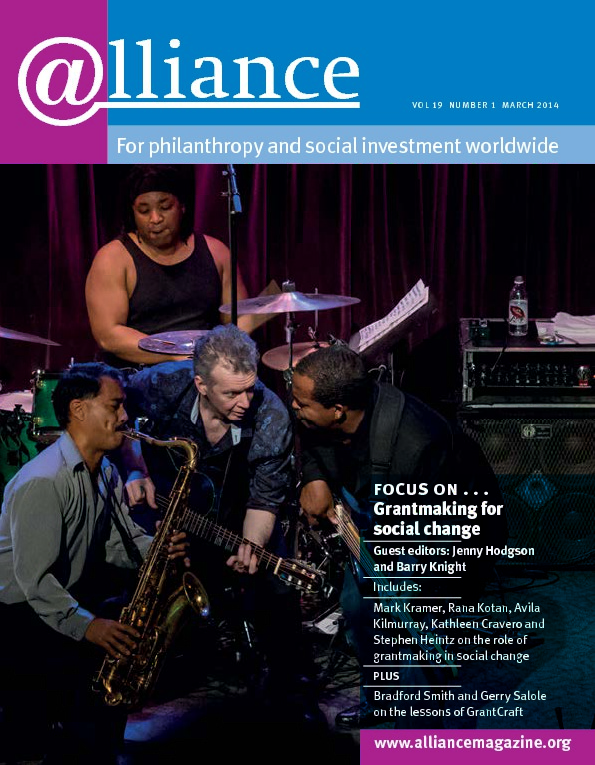Over the past decade or so, there has been notable progress in developing civil society in Turkey, a critical pillar for freedoms of assembly, association and expression. NGOs have enjoyed a more enabling environment resulting in more active programmes addressing gender equality, education reform, urbanization and other critical issues. The mass protests of June 2013 indicated that citizens seek greater involvement and voice. Yet the government’s negative reaction suggests that the pillar of civil society is standing on shaky ground. Given a continued lack of donations from the public and limited resources for NGOs, especially those working on the root causes of inequality, grantmaking has a crucial role to play in ensuring the continued growth and resilience of civil society.
When applied strategically (read: not just cheque-writing), grantmaking has significant impact beyond the issue being funded. It helps to strengthen the civil society sector, particularly by increasing NGO capacities, fostering connections nationally and internationally, and increasing awareness in the media and among government officials. In this context, grants made to NGOs in Turkey go beyond making an investment in social development and justice: they serve to enable and strengthen civil society, which is ultimately an investment in Turkey’s democratization.
With their access to capital, decision-makers and media, foundations in Turkey (those with funds to contribute) have valuable resources and power to share with organizations serving society’s most disadvantaged groups. Yet beyond one-off support, grantmaking has been a road less travelled for most foundations in Turkey. One of the main reasons is that foundations funded by private donors and NGOs have long been spinning in different orbits.
Foundations have been focusing mainly on what I call the ‘hardware’ of society: building schools, hospitals and student dorms, thus making valuable contributions to the physical infrastructure of development. On the other hand, NGOs tend to focus on challenging the status quo and building the ‘software’ which aims to instil the values and practices needed for an equitable, just and open society.[1] An increase in the availability of funding (mainly through government/EU funding, the Open Society Foundation and CSR contributions) has been important in helping to further some programmes. However, private giving, whether through individual or institutional donations, remains scarce.
In 2007, Sabanci Foundation became the first private family foundation in Turkey to formally adopt grantmaking as a practice, and it did so with a strong social justice lens, using an open-call approach and providing various forms of technical support. Just around the same time, in 2008, the Bolu Community Foundation was established. The Third Sector Foundation of Turkey Social Investment Program, created in 2006, helped Bolu as part of its mission to promote new models of philanthropy. Having taken an active role in these initiatives, I can say that both have helped to decrease the orbital distance between private donors and NGOs and increased the capacity and strength of civil society.
Unfortunately, no new private foundation grant programmes or community foundations have been established as of yet. There are concerns about aligning with groups that challenge the status quo and the negative portrayal of NGOs by government officials – especially during times of heightened tension such as the protests – certainly does not help.
There is also a cultural factor at play: donors continue to have a strong tendency to pick a specific issue or programme to support, perhaps due to traditions of building institutions that carry the names of benefactors. Grantmaking is perceived to be more risky and labour-intensive, with less-tangible outcomes, and lower impact and visibility for the donor. This translates into a sector with extremely limited funding opportunities, especially from domestic sources.
By no means does ‘grantmaking’ trump ‘doing’ per se; there are times when a combination of approaches may be the best way to go. But a more diverse application of tactics and tools in the philanthropic space is vital for Turkey’s civil society sector development, and grantmaking is among these. By presenting more evidence about the process and impact of grantmaking, and perhaps introducing more services to ease concerns about taking on such programmes, we might be able to mobilize a broader cadre of donors who are willing to take this less travelled road – one that will ultimately lead to a stronger, more participatory democracy.
Filiz Bikmen is a social investment and philanthropy adviser. Email filiz@cfchange.org





Comments (0)